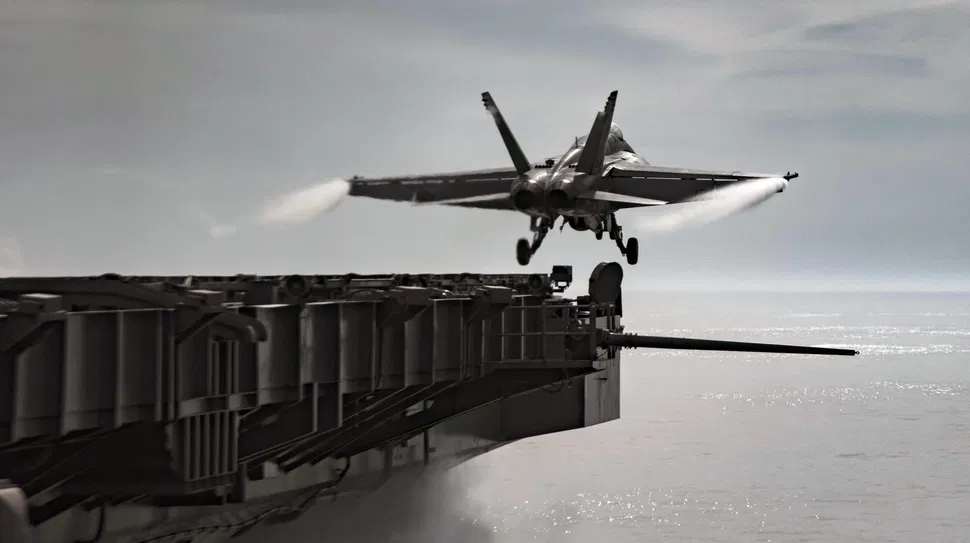Înțelegerea relației militare dintre SUA și Israel
Parteneriatul dintre Statele Unite și Israel în sectoarele militare funcționează ca o componentă semnificativă a dinamicii regionale, contribuind la una dintre cele mai avansate capacități militare din Orientul Mijlociu. De la flote aeriene superioare până la sisteme avansate de interceptare a rachetelor, furnizarea continuă de arme, tehnologie și resurse provenite din SUA fortifică postura strategică de apărare a Israelului. Stabilit în anii 1960, acest parteneriat a fost caracterizat de interese comune care duc la un flux extins de ajutor militar, formalizat în special printr-un acord din 2016 care promite 38 de miliarde de dolari pe parcursul unui deceniu, dedicat în mare parte achiziționării de hardware militar american și inițiativelor de apărare antirachetă.
Componente Cheie ale Lanțului de Aprovizionare SUA-Israel
Trei mecanisme principale constituie baza logisticii militare dintre SUA și Israel, permițând o aprovizionare continuă și fiabilă cu active esențiale pentru apărare:
1. Vânzări Militare Externe (VME)
Gestionat de Agenția de Cooperare pentru Securitate în Apărare (DSCA) a Pentagonului, programul FMS funcționează ca principal conductă pentru armamentele militare americane expediate către Israel. Cu mai multe tranzacții finalizate începând din octombrie 2023, acest sistem de livrare accelerată include muniții și armament avansat, ocolind adesea protocoalele standard de revizuire legislativă pentru a satisface rapid nevoile operaționale urgente.
2. Finanțare Militară Externe (FMF)
Programul FMF alocă anual Israelului 3,3 miliarde de dolari, un flux de finanțare esențial care sprijină achiziționarea de echipamente militare fabricate în SUA. Acest sprijin financiar permite proiecte semnificative, cum ar fi inițiativa de achiziții F-35, care își propune să livreze active operaționale vitale pentru menținerea superiorității aeriene.
3. Stocuri de Rezervă de Război Aliați-Israel (WRSA-I)
WRSA-I reprezintă un depozit vital de echipament militar american situat în interiorul granițelor Israelului, evaluat la aproximativ 1,8 miliarde de dolari. Această rezervă permite mobilizarea rapidă în perioade de conflict, asigurând că resursele militare necesare sunt disponibile imediat atunci când apar conflicte, cum ar fi în timpul tensiunilor escalate cu forțele adverse.
Eforturi colaborative în lanțul de aprovizionare
Operațiunile logistice reprezintă un efort concertat între numeroase entități, inclusiv agenții guvernamentale și contractori privați din domeniul apărării. Departamentul Apărării și DSCA își integrează funcțiile cu supravegherea unor agenții precum Departamentul de Stat pentru a asigura alinierea legislativă și diplomatică adecvată. Printre principalii actori din sectorul privat se numără:
- Lockheed Martin – Creator al avionului de vânătoare F-35, instrumental în comandamentul aerian al Israelului.
- Raytheon – Furnizor al sistemului de interceptare Iron Dome, asigurând apărare antirachetă în timp real.
- Boeing – Furnizor de muniții ghidate cu precizie, cruciale pentru lovituri aeriene strategice.
Împreună, aceste componente creează o rețea logistică globală care cuprinde locații de producție și infrastructuri de transport necesare pentru succesul operațional. În urma atacurilor Hamas din octombrie 2023, Pentagonul a repoziționat efectiv activele militare pentru a asigura sprijin continuu în contextul unui conflict intensificat.
Impactul și amploarea lanțului de aprovizionare SUA-Israel
Proporția logistică ce influențează armata israeliană este uluitoare. Statistici recente indică faptul că SUA a constituit un procent covârșitor de 69% din importurile de arme ale Israelului, depășind semnificativ contribuțiile altor națiuni. Acest sistem de aprovizionare robust a permis transportul unor cantități vaste de echipament militar pentru a sprijini capacitățile Israelului, asigurând accesul la o gamă largă de armament modern, inclusiv avioane de luptă și sisteme de rachete de ultimă generație. Structura de sprijin neclintită îmbunătățește poziția de apărare a Israelului atât prin hardware, cât și prin partajarea de informații, consolidându-i astfel poziția strategică printre adversarii săi regionali.
Integrarea tehnologică în logistica militară
Israelul valorifică tehnologii avansate de apărare americane în diverse operațiuni militare. Integrarea soluțiilor de înaltă tehnologie, cum ar fi elicopterele Apache și munițiile ghidate cu precizie, demonstrează importanța logisticii în războiul modern. Capacitatea de pregătire oferită de WRSA-I sporește flexibilitatea operațională, permițând o desfășurare rapidă a activelor militare necesare atunci când apar crize. Combinată cu capacitățile de transport aerian militar ale SUA, această linie de aprovizionare robustă asigură un răspuns rapid și sporește reziliența operațională.
Implicații strategice și economice
Relația militară dintre SUA și Israel nu servește doar nevoilor logistice, ci reprezintă și un parteneriat economic crucial, permițând Israelului să-și mențină capacitățile de descurajare într-o regiune tumultuoasă. După cum au menționat oficialii militari, sprijinul american este vital pentru pregătirea operațională a forțelor armate israeliene. Fără acest sprijin logistic, ar putea exista o scădere semnificativă a eficienței militare.
Simultan, SUA beneficiază de un parteneriat susținut care alimentează producția internă a industriei de apărare, propulsând creșterea economică și inovația, asigurând în același timp sprijinul aliaților cheie în fața amenințărilor globale. Cadrul logistic stabilit aici servește drept model pentru alte parteneriate globale, sporind rolul și influența SUA în afacerile de securitate internațională.
Lanțul de aprovizionare militară SUA-Israel: Un studiu de caz în logistica apărării
Examinarea lanțului de aprovizionare militară SUA-Israel oferă perspective profunde asupra interacțiunii complexe dintre logistică, tehnologie și strategii de apărare. În paralel cu inițiative guvernamentale semnificative, există contracte și parteneriate cu entități private care stimulează eficiența operațiunilor și a rezultatelor. Acest sistem complex ilustrează faptul că eficacitatea parteneriatelor militare se bazează în mare măsură pe rețeaua logistică ce facilitează mișcările de resurse și sprijin, strategice și la timp.
Concluzie
Influența lanțului de aprovizionare al SUA asupra operațiunilor militare israeliene servește drept o reamintire crucială a capacității logisticii de a îmbunătăți strategiile de apărare națională. Amestecul de coordonare guvernamentală, ingeniozitate a sectorului privat și tehnologie militară avansată consolidează eficacitatea generală a acestui lanț de aprovizionare. În timp ce nuanțele experienței personale cu aceste servicii depășesc adesea cunoștințele teoretice, accesibilitatea și rentabilitatea transportului de marfă oferite prin platforme precum GetTransport.com împuternicim companiile și persoanele fizice să își gestioneze eficient propriile necesități logistice. La GetTransport.com, asigurarea transportului de marfă la prețuri globale competitive este la doar un clic distanță, contribuind la asigurarea livrării rapide și fiabile a transportului la destinație. Rezervă-ți cursa la GetTransport.com.

 Rolul lanțurilor de aprovizionare americane în susținerea eforturilor militare israeliene">
Rolul lanțurilor de aprovizionare americane în susținerea eforturilor militare israeliene">